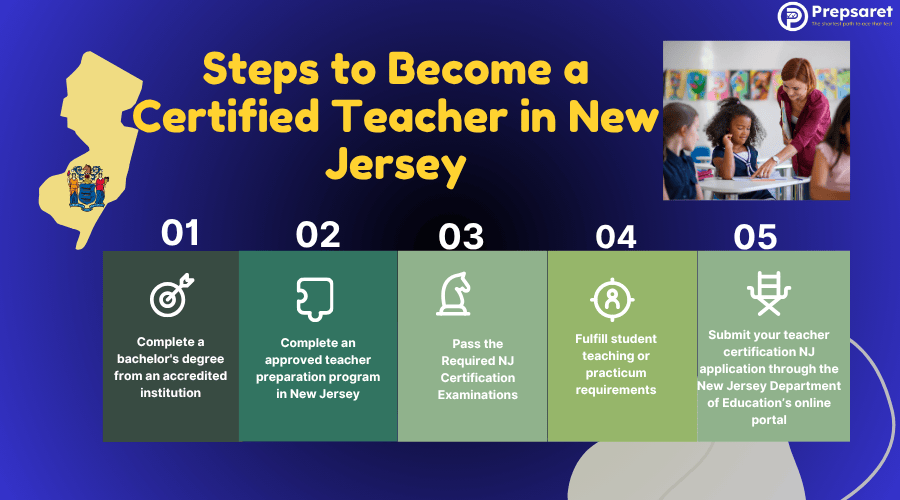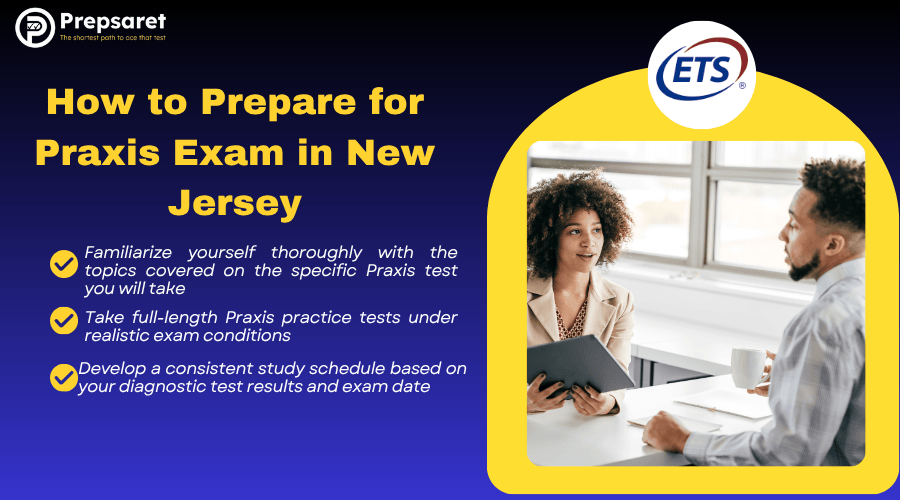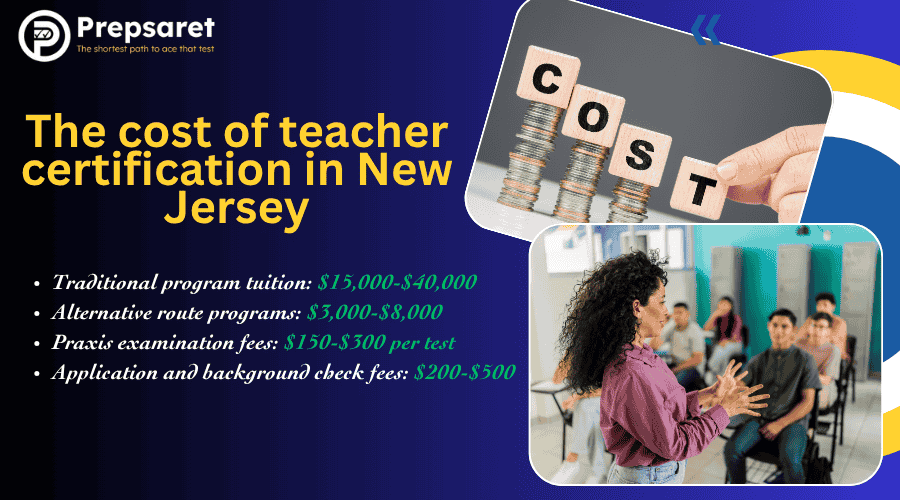How to Become a Teacher in New Jersey requires navigating specific state requirements and certification processes. The Garden State offers multiple pathways to teaching, whether through traditional degree programs or alternative routes.
The New Jersey Department of Education sets comprehensive standards for educator certification, ensuring all teachers meet rigorous qualifications. Prepsaret provides essential prep resources for the Praxis exam, helping aspiring educators succeed in their certification journey.
New Jersey Teaching Requirements
Understanding NJ teaching requirements is the first step for anyone planning a teaching career. The state enforces clear public school teaching requirements to ensure every student benefits from high-quality instruction.
The New Jersey Department of Education teacher requirements include:
- Completion of an approved teacher preparation program
- Passing scores on required examinations
- A bachelor’s degree from an accredited institution
- Background clearances and health certifications
Teaching Degree Requirements in NJ Public Schools
The teaching degree requirements NJ public schools mandate that all candidates hold at least a bachelor’s degree in their subject area or in education with the proper endorsements. This ensures that future teachers demonstrate both strong content expertise and the pedagogical skills needed for effective classroom instruction.
Steps to Become a Certified Teacher in New Jersey
The steps to become a certified teacher in New Jersey follow a structured pathway designed to ensure every educator meets state standards. By completing each stage, you’ll be on track to earning your New Jersey teaching license.
Step 1: Complete Your Education
Earn a bachelor’s degree from an accredited institution. Your degree should align with the subject or grade level you plan to teach.
Step 2: Enroll in a Teacher Preparation Program
Complete an approved teacher preparation program NJ that includes supervised student teaching. This experience provides essential classroom training.
Step 3: Pass the Required NJ Certification Examinations
Take and pass all exams required by the state, such as the Praxis exam New Jersey for your certification area.
Read More: How Praxis Scoring Works
Step 4: Apply for Teacher Certification in NJ
Submit your teacher certification NJ application through the New Jersey Department of Education’s online portal, including all supporting documentation.
New Jersey Certification Timeline and Checklist
The state teaching certification process typically takes 4–6 weeks once all materials are submitted. Following this NJ teacher certification checklist ensures you don’t miss critical steps:
- Official transcripts from all colleges attended
- Praxis score reports
- Fingerprint and background clearances
- Teacher preparation program verification
- Application fee payment
Teacher Preparation Programs in New Jersey
Selecting the right teacher preparation program NJ institutions offer is essential for certification success. Teacher education programs in NJ are available at numerous colleges and universities throughout the state.
Types of Teacher Preparation Programs in NJ
- Traditional undergraduate education degrees – Designed for first-time college students, these programs combine general education courses with pedagogy and usually take four years to complete.
- Post-baccalaureate certification pathways – Ideal for career changers who already hold a degree, these shorter programs focus on meeting New Jersey certification requirements without repeating general education coursework.
- Master of Arts in Teaching (MAT) programs – A graduate-level path for those seeking both certification and advanced expertise in instructional methods, often completed in 1–2 years.
- Graduate-level endorsement or specialization programs – Tailored for licensed teachers who want to add certifications in areas like ESL, special education, or subject-specific endorsements.
These programs combine coursework in education theory, teaching methods, and classroom management with hands-on student teaching experiences. Most programs require 100+ hours of field experience before student teaching.
Read more: Praxis test prep
Exams and Background Checks for NJ Teacher Certification
Before earning certification, aspiring teachers must complete required exams and clear mandatory screenings. The Praxis exam New Jersey evaluates academic readiness and subject knowledge, while background checks confirm candidate suitability for classroom teaching.
Core Academic Skills for Educators
This exam measures foundational abilities in reading, writing, and mathematics. Passing scores ensure future teachers meet essential academic standards for effective instruction.
- Praxis Core Academic Skills: Reading (5713)
- Praxis Core Academic Skills: Writing (5723)
- Praxis Core Academic Skills: Mathematics (5733)
Subject-Specific Praxis Tests
These assessments evaluate content knowledge in the subject area you plan to teach. Requirements vary by grade level and specialization.
How to Prepare for Praxis Exam in NJ
Prepsaret offers comprehensive Praxis preparation materials with practice tests, study guides, and detailed answer explanations to maximize your success rate.
Background Check Requirements for NJ Teachers
The background check for teachers NJ process ensures student safety and professional accountability. Applicants must complete:
- FBI criminal history check
- New Jersey State Police background check
- Child Abuse Record Information check
- Department of Children and Families check
These screenings are mandatory before you can obtain certification and must be renewed periodically throughout your teaching career.
Pursuing Teaching Credentials in NJ Through Traditional Programs
Are you wondering how to become a teacher in NJ with a bachelor’s degree through the traditional route? It requires completing an approved teacher preparation program either during or after your undergraduate studies.
Benefits of Traditional Teacher Certification Programs in NJ
Students pursuing teaching credentials New Jersey through traditional programs benefit from:
- A structured curriculum that blends education theory with instructional practice
- Supervised student teaching placements in real classrooms
- Mentorship opportunities with experienced educators
- Professional networking connections within the education community
This pathway typically takes four years for undergraduates or 1-2 additional years for those completing post-baccalaureate programs.
Alternate Routes to Teaching in New Jersey
Wondering how to become a teacher in NJ alternate route? These programs serve professionals transitioning from other careers. NJ alternative route teaching provides flexibility for career changers who already possess bachelor’s degrees.
The alternative route to teaching certification in NJ includes several pathways:
- Alternate Route Program (ARP): Designed for individuals with bachelor’s degrees who want to teach but lack formal education training.
- Post-Baccalaureate Program: For those with degrees in specific subject areas seeking teaching certification.
Teaching Without a Traditional Education Degree in NJ
How to become a teacher in New Jersey without a traditional education degree is possible through these alternative pathways. How to become a teacher in NJ without a teaching degree requires meeting specific eligibility criteria including:
- Holding a bachelor’s degree with the required GPA
- Demonstrating subject-area expertise
- Completing alternative preparation coursework
- Finishing a supervised student teaching or fieldwork component
This flexible route helps expand the teaching workforce by opening opportunities to skilled professionals from diverse backgrounds.
How to Become a Teacher in New Jersey Online
The pathway for becoming a teacher in New Jersey online has grown in popularity, especially among working professionals and career changers. Online programs maintain rigorous standards and fully meet New Jersey teacher certification requirements.
Many universities now offer hybrid or fully online teacher preparation programs that still meet all state certification requirements.
Most online or hybrid programs balance flexibility with practical experience by offering:
- Virtual coursework and interactive assignments
- Online seminars, lectures, and peer discussions
- Local student teaching placements in approved schools
- Remote supervision and mentorship from faculty advisors
These online options maintain the same rigorous standards as traditional in-person programs while accommodating busy schedules and diverse learning needs. Candidates benefit from both academic preparation and the classroom experience required for certification.
Out-of-State Teachers Reciprocity in New Jersey
Teacher reciprocity in NJ provides certified educators from other states the opportunity to transfer their credentials and continue teaching in New Jersey. This process helps qualified teachers enter the state’s workforce without repeating the full certification pathway
Requirements for Out-of-State Teachers in New Jersey
The requirements for out-of-state teachers in New Jersey depend on the type of certification you currently hold and the state where you earned it. Common steps include:
- Verification of a current, valid teaching certificate
- Submission of official transcripts for evaluation
- Completion of additional coursework if required by New Jersey standards
- Passing the Praxis exam New Jersey, when applicable
Reciprocity Agreements With Other States
While some states have near-full reciprocity agreements with New Jersey, others may require extra steps to align with state-specific standards. Educators should consult the New Jersey Department of Education teacher requirements for the most accurate guidance.
Related post: How to Become a Teacher in New York
Continuing Education and License Renewal in NJ
In New Jersey, continuing education for teachers is essential for maintaining an active teaching license. Educators must complete 100 hours of professional development every five years as part of the New Jersey teacher license renewal process.
Key requirements include:
- Participation in approved professional development activities
- Maintaining effective teaching evaluation ratings
- Updated background clearances
Professional development may include graduate courses, workshops, conferences, or district-sponsored training programs, ensuring teachers stay current in their field.
Costs, Timelines, and Career Outlook for Educators in NJ
The cost of teacher certification in New Jersey varies depending on your chosen pathway:
- Traditional program tuition: $15,000-$40,000
- Alternative route programs: $3,000-$8,000
- Praxis examination fees: $150-$300 per test
- Application and background check fees: $200-$500
How Long Does it Take to Become a Teacher in NJ?
The time it takes to become a teacher in NJ depends on your starting point:
- Traditional undergraduate route: 4 years
- Post-baccalaureate programs: 1-2 years
- Alternative route programs: 1 year
New Jersey offers competitive teacher salaries and benefits, making it an attractive destination for education professionals.
Related post: how long do praxis scores take
How to Become a Teacher in New Jersey: FAQs
How Do I Become a Teacher Without a Teaching Degree in NJ?
You can pursue alternative route certification programs that allow individuals with bachelor's degrees in other fields to obtain teaching credentials through specialized preparation programs.
What Is a Teacher's Salary in New Jersey?
New Jersey teachers earn competitive salaries ranging from $45,000-$90,000 annually, depending on experience, education level, and district.
How Hard Is it to Become a Teacher in NJ?
Becoming a teacher in NJ requires dedication and meeting rigorous standards, but the state provides multiple pathways and support systems to help candidates succeed.
What Is the Quickest Way to Become a Teacher?
Alternative route programs offer the fastest pathway, typically taking one year to complete while you begin teaching with a provisional certificate.
Is There a Demand for Teachers in NJ?
Yes, New Jersey has ongoing demand for qualified teachers, particularly in STEM subjects, special education, and bilingual education areas.
How to Become a Teacher in New Jersey: Conclusion
How to Become a Teacher in New Jersey involves following specific certification requirements, completing approved preparation programs, and passing required examinations. Whether pursuing traditional or alternative pathways, success depends on thorough preparation and meeting all state standards.
Prepsaret provides the comprehensive Praxis preparation materials you need to excel on certification exams. Start your teaching journey today, visit Prepsaret for practice tests and study resources that ensure your how to become a teacher in New Jersey goals become reality.




